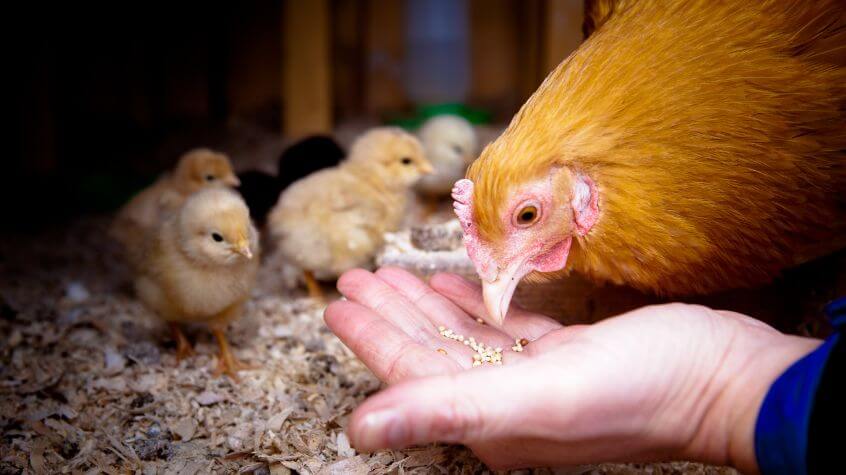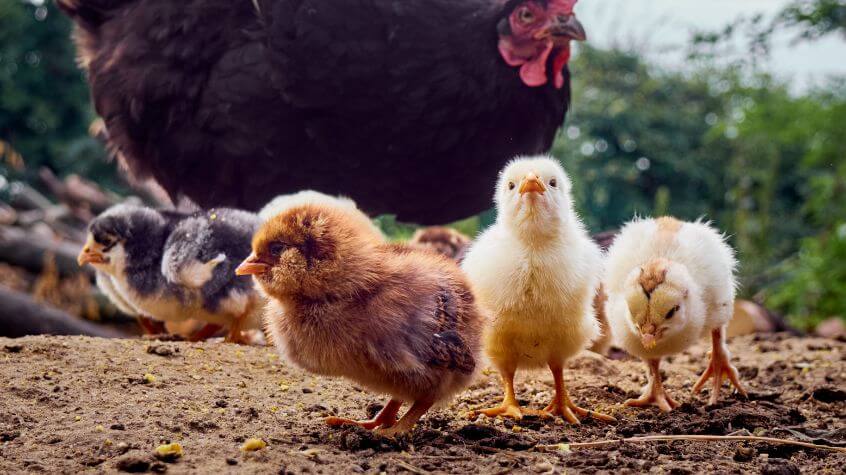Wondering how to raise backyard chickens? Well, just wing it!
Whether you’re a seasoned gardener or just starting out with your backyard farm, keeping chickens can be a rewarding experience.
Chickens are the rock stars of the backyard farm, and like any rock star, they have their quirks. If you’re new to chicken parenting, here’s your crash course on the dos and don’ts of raising happy and healthy chickens.
Do: Choose the Right Chicken Breeds
When starting your flock, it’s crucial to choose the right breeds suited to your needs.
For beginners, docile and productive breeds like Rhode Island Reds and Plymouth Rocks are excellent choices. They are known for their reliability in egg production and friendly demeanor, making them easy to handle, even for children.
Fancy a colorful egg basket? Breeds like Easter Eggers or Ameraucana chickens lay eggs in shades of blue and green, adding a fun twist to your morning routine.
For those looking for pet-like backyard chickens? Consider fluffy, friendly, and fabulous Silkies! Silkies are renowned for their fluffy plumage and gentle disposition.
Do: Give Them The Right Chicken Feed
Chicks are like teenagers—they eat a ton and grow like weeds! Proper nutrition from wholesome animal feed is essential for healthy chickens and quality egg production.
Start chicks off with a balanced chick starter feed that provides all the nutrients they need to turn from fluffy cuteness into gangly adolescents.
When your backyard chickens mature enough to hit that awkward teenage phase (around 6 weeks), transition them to grower feed that supports steady development without overloading them with unnecessary supplements.
Once your hens start laying eggs (around 5-6 months), switch to a layer feed enriched with calcium to promote strong eggshells.
Don’t: Give Them Junk Food
Chickens love kitchen scraps, but they’re not garbage disposals. Avoid feeding them salty snacks, chocolate, or anything moldy.
Instead, keep your hens healthy, folks! Give them grains, veggies, and the occasional fruit treat to supplement their diet. They’re not on a diet, but they’re not junk food addicts either.
Do: Choose the Right Bedding
Think of your chicken coop as their sanctuary, and the bedding as their comfort zone. There are several bedding materials that keep your chickens cozy and warm.
- Pine shavings: Plush and absorbent, pine shavings are a comfortable resting place that mimics a natural forest floor. It’s also easy to clean and replace!
- Straw: Composed of dried grain plant stalks, straw offers a soft mattress for chicks and hens. While biodegradable insulating, and affordable, straw requires frequent cleaning.
- Sand: Sand is the beach holiday of chicken bedding, it’s perfect for a dry and clean coop! The texture deters pests and makes the bedding easy to sift and clean on a routine basis.
Wondering what chicken bedding to avoid? Cedar—it smells great but can harm your chickens’ respiratory systems.
Don’t: Ignore the Cleaning
Nobody likes a dirty house, chickens included. Clean the coop regularly to prevent the buildup of droppings and dirt. This helps you spare your chickens from common bacteria and diseases caused by a messy habitat.
You should also make sure your chickens always have access to a clean source of water. Hydration is crucial, especially during hot weather.
A clean coop is a happy coop, and happy hens lay more eggs. Plus, it keeps the neighbors from complaining about the smell.
Do: Monitor Your Chicken’s Health
You should always be monitoring the health of your chicken flock. Look for signs of illness such as lethargy, unusual droppings, or changes in appetite.
Additionally, you should keep an eye on your coop’s population. Chickens need space to get comfortable and avoid stress.
Speaking of stress, make sure you predator-proof your coop and run. Secure fencing and latches can prevent unwelcome visits from common New Jersey predators like raccoons, hawks, foxes, and weasels.
Don’t: Overwhelm Yourself
If you’re a beginner at chicken care, start with a small flock. Chickens are like potato chips—you can’t have just one, but too many chickens can turn your dream of fresh eggs into a feathery nightmare. Begin with 3-5 hens and see how it goes.
Remember, raising chickens is an adventure. Embrace the chaos, enjoy the fresh eggs, and most importantly, don’t take yourself too seriously and have fun!
Do: Find A Chicken Supply Store

Live in New Jersey and searching for a chicken supply store near you? Find your nearest farm supply store and make sure their shelves are stocked with everything you need for raising chickens. Supplies to look out for include chicken feed, bedding, health supplements, and coop accessories.
If you’re not sure where to start, consider Mendham Garden Center. With garden centers and farm supply stores throughout NJ staff is ready to help any new or experienced chicken parent in the state. You can even find chicks at the locations below during the Spring:
When you’ve found the store for you, start building a relationship with its staff. Anyone in a farm or chicken supply store will be able to provide valuable insights and advice tailored to your area’s specific needs.
Bonus Tips for Raising Chickens
- Understanding Chicken Behavior: Chickens are curious creatures that thrive on routine and a sense of security. Establishing a daily feeding schedule and providing consistent care will help them feel safe and content.
- Seasonal Considerations: Adjust your chicken care routine based on the seasons. During colder months, ensure your coop is well-insulated and provide additional bedding to keep chickens warm. In hotter weather, provide shade and ensure ample ventilation to prevent heat stress.
- Egg Production: To maximize egg production, ensure your hens have access to at least 14 hours of daylight. Consider supplementing natural light with artificial light during shorter days to maintain consistent egg laying.
- Health Maintenance: Regularly check for parasites such as mites and lice, especially around the vent area. Use appropriate treatments if infestations occur and maintain a clean environment to minimize health risks.
- Community and Resources: Joining local poultry clubs or online forums can provide valuable support and advice from experienced chicken keepers. These communities often share tips on breed selection, health management, and troubleshooting common issues.
Conclusion
Raising backyard chickens is not just a hobby; it’s a lifestyle that promotes self-sufficiency and connects you with your food source. By following these tips and guidelines, you’ll be well-equipped to start your backyard flock successfully. Embrace the joys and challenges of chicken parenting, enjoy the fresh eggs they provide, and remember—every cluck and crow is a reminder of your journey towards sustainable living.
Whether you’re interested in large or small chicken breeds, organic chicken feed, or simply enhancing your backyard farming experience, these insights will guide you toward becoming a confident chicken keeper.
Ready to embark on this feathered adventure? Best of cluck to you! 😊

